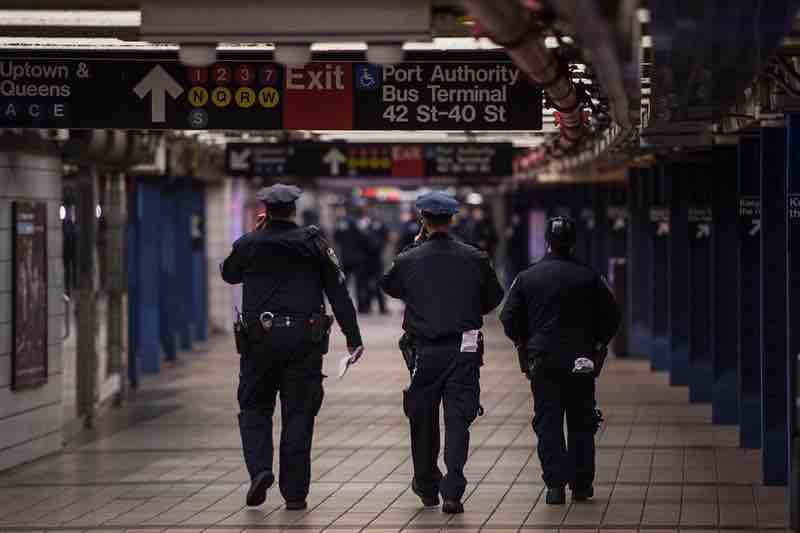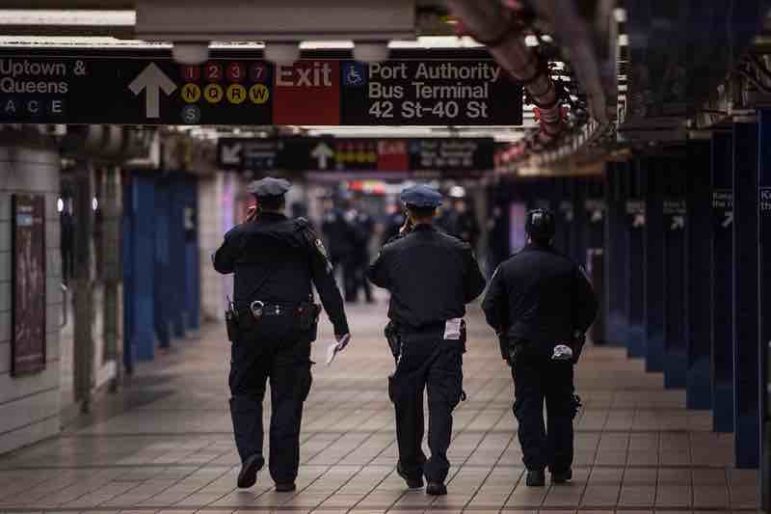
“While from time to time, our system does hold people of wealth, power, and/or influence accountable for their violations of the law, these kinds of cases do not represent the bulk, or even close to it, of the criminal prosecutions that take place here.”

Michael Appleton/Mayoral Photography Office
NYPD officers.
There’s a telling anecdote that’s circulated for years, if not decades, in and around New York’s criminal legal system. A group of legal scholars from a foreign country—could be Japan, Germany, Brazil, wherever—arrive in our city planning to study our courts with the assistance of local academics knowledgeable about our system.
After several days of observing our courts, the visiting scholars seem perplexed and raise a central question of our academics: Where do you prosecute white people?
This anecdote, which may have taken place, and perhaps even more than once, reflects a different picture of the American justice system than many pundits and politicians sought to paint in the days following the admittedly highly unusual trials and felony convictions of an ex-president and the son of a sitting president. We would see and hear many times on television news shows and read in our newspapers and magazines that the value of these court cases was that they effectively demonstrated that in our country, state, or city that “no one is above the law.”
President Joe Biden spoke at the White House the day after the Trump jury announced its verdict, stating: “The American principle that no one is above the law was reaffirmed.” I was actually surprised that Biden didn’t repeat the point during his recent debate with Trump, but our current president bungled a lot of his talking points that night, didn’t he?
“No one in this country is above the law,” said David Wise, the special counsel who successfully prosecuted the president’s son Hunter Biden on gun charges. Legal expert Sophia Nelson, former Republican Congressional Investigative Committee counsel, wrote in Politico Magazine: “Most of all, this verdict shows that we actually practice what we preach: No American is above the law.”
The co-hosts of the popular television talk show “The View” agreed that the Hunter Biden verdict shows that no one is above the law. Editorial boards of newspapers across the country, the San Antonio Express News and the Miami Herald being just two examples, pronounced that, “no one is above the law.”
As welcome as these prosecutions and outcomes may have been for many of us, it is unwise, if not flatly misguided, to draw any sweeping positive conclusions from them. While from time to time, our system does hold people of wealth, power, and/or influence accountable for their violations of the law, these kinds of cases do not represent the bulk, or even close to it, of the criminal prosecutions that take place here.
The people of fame and standing who wind up in prison also do not come close to being representative of the vast majority of people confined in prisons and jails across our country. The hard truth is that our justice system is a far distance away from being a fair and equitable entity. Law enforcement in New York—the system I am most familiar with—and in other urban jurisdictions in the U.S. target low income people of color and virtually ignore, with occasional noteworthy exceptions, well-to- do or relatively well-to-do white people.
My conclusions are based on my experiences and observations accumulated during more than 40 years working professionally on prison, policing, and criminal court issues. No need to depend on my opinion, though: the facts speak all too loudly in exposing the system’s grossly disproportionate impact on our poor and marginalized citizens.
- Data show that over the years 93-95 percent of juvenile arrests in New York City involve Black or Latino young people.
- Over 90 percent of the people confined on Rikers Island are New Yorkers of color, there for two basic reasons: they’re too poor to afford bail and an NYPD officer arrested them. The New York Daily News has reported that in 2023, New Yorkers of color made up 94 percent of NYPD stops. Though Black residents make up 20 percent of the city’s population, they represented 60 percent of recorded stops.
- Government statistics report that year after year, 87-88 percent of misdemeanor arrests in New York City involve New Yorkers of color. Moreover, over 50 percent of yearly felony arrests consistently involve Black New Yorkers, though, again, they make up only 20 percent of the city’s population.
- PROP’s Court Monitoring Project, where we observe the city’s arraignment parts as a way to track NYPD arrest practices, has since 2014 reported on and exposed the police department’s racist tactics. For example, from June 2014 through December 2023, our representatives have witnessed cases in the arraignment parts of Manhattan, Brooklyn, the Bronx, Queens, and Staten Island. Of the total 8,310 cases seen, 7,460 or 89.8 percent involved New Yorkers of color. Under Mayor Eric Adams, the racial disparity has become even more stark: of the 1,567 cases we have observed during Adams’ first two years in office, 1440, about 92 percent, involved people of color.
- Finally, demonstrating that New York’s numbers exposing racial disparities reflect justice policies and practices across our nation, the federal Bureau of Justice Statistics reports that nationally, the incarceration rate for Black Americans is six times the rate of white Americans and more than twice the rate in every single state.
Correcting the racial injustices characterizing our criminal legal machinery will entail fundamental changes in how our police, courts, and prisons operate—changes that most elected leaders consider too politically controversial, too radical. Without such basic reforms, however, our society and nation will continue to perpetuate abuses that compromise the quality of life and violate the rights of Americans of color everyday.
Our so-called justice system will continue to make a mockery of the American values we claim, of the words from Thomas Jefferson etched above the entrance to Manhattan’s criminal court: “Equal and exact justice for all men of whatever state or persuasion.” Or in more contemporary parlance: “No one is above the law.”
Robert Gangi is the executive director of the Police Reform Organizing Project (PROP). Prior to founding PROP in 2011, he was executive director of the Correctional Association for over 29 years.





